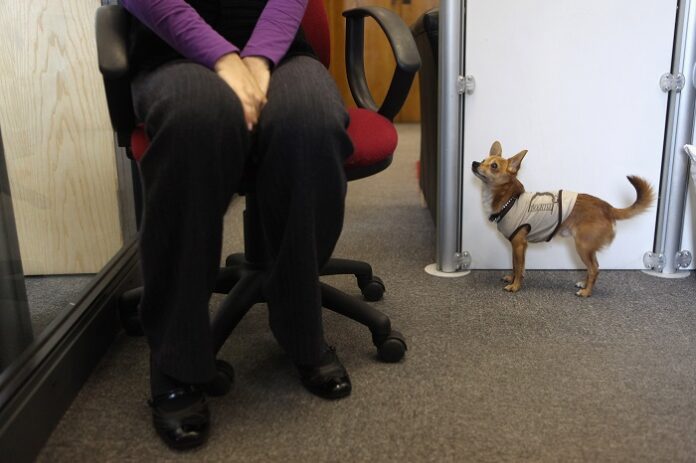Wanting a dog since childhood, Maribeliz Ortiz finally made the decision earlier this year to get her “dream dog”–a miniature long-haired dachshund she named Niko.
The 27-year-old, who was excited to add to a puppy to her family, got help with the cost of welcoming Niko from an expected source: her employer.
Ortiz’s employer–The Zebra, an Austin-based insurance comparison website–this year rolled out an extremely rare benefit: covering expenses up to $300 annually for employees adopting a new cat or dog into their family.

“It feels really nice to be supported by my company to help start a family in the way I can right now,” says Ortiz, who works as an agency quality assurance coordinator at the company.
Related: Read more on benefits from HRE
The unique benefit was made available to employees in January but was just publicly announced. So far, six employees have taken advantage of the perk, and the company anticipates at least 10-15 will use it by the end of the year.
Though it’s not a benefit many of the company’s 250 employees will use in the way they do health insurance or paid time off, The Zebra says the pet adoption benefit pays big dividends in employee morale and wellbeing–especially during the coronavirus pandemic. The pandemic has not only resulted in pet owners spending significantly more time at home with their pets, but it’s prompting an exponential increase in pet adoptions.
“Especially now, during this pandemic and the impact it can have on someone’s lifestyle, having a furry friend can make an enormous difference in our mental, emotional and even physical wellbeing,” says Adrienne Rampaul, head of people at The Zebra. “Companionship can soothe the soul.”
Keith Melnick, CEO of The Zebra, adds that his dog, a Labrador named Zuma, has improved his mental health and quality of life, and he hopes his employees can have similar experiences. “Especially now that we’re all working remotely for the foreseeable future, I want to make sure that anyone at The Zebra who wants to, can experience that,” he says.
The Zebra’s new benefit was in part inspired by its recent parental leave policy revamp, which prioritized “family structures of all shapes and sizes,” Rampaul says. “We wanted to be thoughtful about the various ways people add to their family, and so the idea for our pet adoption perk was born,” she says.
The pet adoption benefit adds to The Zebra’s robust and unique set of benefits: The company also offers 20 weeks of fully paid parental leave for the primary caregiver, and 16 weeks of fully paid parental leave for the secondary caregiver, in birth or adoption of a child, with flexible reentry to work; a $100 monthly wellness perk; summer Friday release at 2 p.m.; unlimited paid time off; flexible work from home options; weekly catered lunches; an in-house barista; fully stocked snack and drink pantries; and more.
[click_to_tweet tweet=”.@TheZebraCo rolled out a new #employeebenefit that may be especially appealing for #employees spending more time at home because of the #coronavirus. @mayereditor has the details on the #petadoption assistance ” quote=”Tweet this story” theme=”style3″]
The last few years have seen a boost in employee benefits for pet parents, although they’re still somewhat rare. According to the latest available statistics from the International Foundation of Employee Benefit Plans, 6% of employers offer unpaid pet paternity leave–often dubbed “pawternity”–and 16% offer pet insurance as a voluntary benefit. There are no available figures on pet adoption benefits, and The Zebra claims it’s one of the first companies to offer such a perk.
While benefits for new parents have been increasing over the last several years, experts say that benefits for pet owners, like The Zebra’s, may continue to grow as employees expand their definition of family.
“As employers seek to differentiate themselves and build a culture centered on employees’ interests and priorities, benefits like pet perks can play an important role,” says Julie Stich, IFEBP’s vice president of content. “Knowing your employees, and acknowledging that four-legged friends are family members, can help build morale and loyalty to the organization.”





